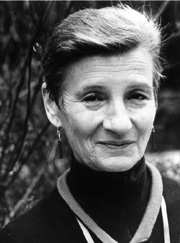 Bella Lewitzky, 88, the legendary
choreographerwho fought
censorshipin the arts, died July 16 at an assisted care home in Pasadena, Calif., after a
stroke. Bella Lewitzky, 88, the legendary
choreographerwho fought
censorshipin the arts, died July 16 at an assisted care home in Pasadena, Calif., after a
stroke.
Ms. Lewitzky, a star dancer in her youth, established herself as a pioneer in the field of modern dance as artistic director and choreographer of the internationally renowned Lewitzky Dance Company, which she founded in 1966.
Her dance career was launched with the influential West Coast choreographer Lester Horton, who was also a mentor of Alvin Ailey and Carmen de Lavallade. She became Horton's colleague and founded with him the Dance Theater of Los Angeles in 1946, one of the few institutions in the United States to house both a dance school and theater under the same roof.
In 1966 she formed the Lewitzky Dance Company, for which she continues to create dances. Under her artistic guidance, the company has become one of the leading international modern dance companies, performing to critical acclaim in 43 states across the U.S. as well as 20 countries on five continents.
The originality, humanity and unconventional qualities for which Lewitzky's dances are famous have often found their way into the management of her company. At a time when it is fashionable for dance companies to be based in New York -- and dangerous not to be -- she has kept her company operating out of her native Los Angeles for thirty years.
It also led to a controversial
episodein 1990, when she
crossed outthe
anti-obscenity clauseon the acceptance form of a ,000
NEAgrant. She eventually had to sue NEA-chairman John E. Frohnmayer to have the grant
reinstated. The New York Times quoted her as saying in response, "I've been struggling in dance for 28 years. To exist merely to exist is stupidity. To exist to make art is a pretty grand act."
She guided the Los Angeles-based company for more than 30 seasons before retiring in 1997.
That year, President Bill Clinton presented her with the National Medal of the Arts for her contributions to the growth and support of the arts.
Her support came in the form of political
activism. In the 1950s, she refused to answer questions about possible communist activities in the art world when she was
subpoenaedto testify before Sen. Joseph R. McCarthy's House Committee on Un-American Activities.
Although she no longer performs, her creative energy continues
unabated, with each year seeing the creation of at least one eagerly awaited new dance. She has not stopped caring about her art form, a fact borne out by the numerous awards she has received for service to dance and the advisory and honorary positions she holds on boards and councils of prestigious arts institutions across the nation.
In 1991, she successfully challenged the National Endowment for the Arts to remove an anti-obscenity clause from its grants applications.
Bella Lewitzky is Los Angeles's own gifted artist, extraordinary educator, caring, humanitarian and champion of freedom of expression.
"Art teaches how to dream, to fantasize and to imagine," Ms. Lewitzky said in one of the lectures she regularly gave. "Without this capacity, we have little ability to progress."
|
